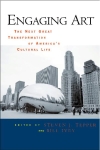« Some Comments from Readers | Main | "You've got nowhere to run, Nutcracker!" »
June 17, 2007
Analogies and their discontents
by Robert LevineSports analogies are inevitable when discussing the business of the performing arts, in the same way that small-business analogies are inevitable when discussing how orchestras operate. No doubt the orchestra business has learned a lot from both, and has more to learn. (How about luxury boxes so that we can treat our wealthy patrons to some exclusivity and soak them for even more money?)
But both analogies are dangerous, because they're fundamentally not on point. Orchestras pay people and vendors, sell and market product, and are deeply concerned with how revenue compares to expenses. But the bottom line is the complete inverse of the bottom line for a for-profit. For-profits make widgets in order to make money; orchestras make money (or try to break even) in order to play concerts. The bottom line for orchestras is not the bottom line on the balance sheet; it's whether or not the orchestra performs its core mission and is seen to do so.
Same with sports. People come to ball games in order to have fun, be entertained, get out of the house, convince their date to sleep with them - whatever. They even come to ball games for aesthetic experiences (and a good double play, like third to second to first, is as beautiful as anything you'll see anywhere). Just like orchestras, right?
Not really. To grossly over-simplify, sports derive from war and the performing arts derive from worship. The Greek theater grew out of religious ritual, and always had a core component of religious content. Much of the canon of western music also came from worship, directly or indirectly (an example of "indirectly;" Sibelius, who wrote nothing related to worship, was profoundly influenced by Palestrina). Opera was originally intended as a re-invention of the Greek dramatic tradition. Obviously theater comes from the same tradition. I suspect that even ballet can be traced back to the same ur-stream.
Given how hard-wired tribalism, and the resulting carnage, seems to be in the human genome, it's no surprise that people still experience sport and the performing arts very differently. Even religion does best, at least in worldly terms, when it allies itself to tribalism.
I'd like to add a caveat, though. The business of sports has changed as dramatically (in some ways far more so) over the past 50 years as has the business of the arts.
One example is enough for now. Most baseball fans (and all of a certain age) know about Bobby Thomson's "shot heard 'round the world" in 1951. (I've read up about it because I was named after Bobby Thomson.) Few remember that the game in question, which was the last game of an extremely rare league play-off, and the climax of the most exciting pennant race before or since, was not played to a sold-out park. Think about how inconceivable that would be today, and think about why.
Posted by rlevine at June 17, 2007 6:51 PM
COMMENTS
Fact checker: the idea of generating cash by offering wealthy patrons expensive year-long subscriptions to exclusive luxury boxes was invented by Lorenzo da Ponte (also known for his libretti to Mozart's Don Giovanni and Cosi fan tutti). He devised this system to save the Burg Theater in Vienna from bankruptcy in 1788 when Imperor Joseph II decided he no longer wanted to subsidize it. He also sucessfully piloted subscriptions for various single ticket packages.
Posted by: Nastya at June 18, 2007 7:24 AM
Post a comment
Tell A Friend
Resources
Engaging Art: The Next Great Transformation of America's Cultural Life Chapter downloads MP3s Vanessa Bertozzi on audiences and participation Vanessa Bertozzi on involving artists in work Steven Tepper argues the historical context of arts in America
Abstracts
Chapter 4
In & Out of the Dark - (a theory about audience behavior from Sophocles to spoken word)
Chapter 7
Artistic Expression in the age of Participatory Culture (How and Why Young People Create)
Chapter 8
Music, Mavens & Technology
(all chapters in pdf form)
Steven Tepper talks about technology and the future of cultural choice
Lynne Conner on the historical relationship between artist and audience
Lynne Conner on event and meaning and sports
AJ Blogs
AJBlogCentral | rss
culture
Terry Teachout on the arts in New York City
Andrew Taylor on the business of arts & culture
rock culture approximately
Rebuilding Gulf Culture after Katrina
Douglas McLennan's blog
Art from the American Outback
Scott McLemee on books, ideas & trash-culture ephemera
Jan Herman - arts, media & culture with 'tude
dance
Apollinaire Scherr talks about dance
Tobi Tobias on dance et al...
media
Jeff Weinstein's Cultural Mixology
Martha Bayles on Film...
music
Greg Sandow performs a book-in-progress
Howard Mandel's freelance Urban Improvisation
Focus on New Orleans. Jazz and Other Sounds
Exploring Orchestras w/ Henry Fogel
Kyle Gann on music after the fact
Doug Ramsey on Jazz and other matters...
Greg Sandow on the future of Classical Music
Norman Lebrecht on Shifting Sound Worlds
publishing
Jerome Weeks on Books
visual
Public Art, Public Space
John Perreault's art diary
Lee Rosenbaum's Cultural Commentary
Tyler Green's modern & contemporary art blog
Special AJ Blogs
June 14-20, 2007



